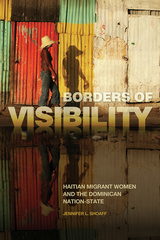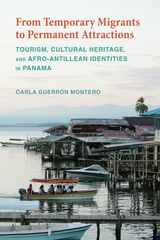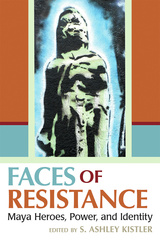160 pages, 6 x 9
6 color figures - 1 map
Hardcover
Release Date:15 Feb 2022
ISBN:9780817321161
Good Maya Women
Migration and Revitalization of Clothing and Language in Highland Guatemala
University of Alabama Press
Analyzes the forced migration of Maya women from highland Guatemala and their turn toward language and Indigenous clothing in their homeland
Good Maya Women: Migration and Revitalization of Clothing and Language in Highland Guatemala analyzes how Indigenous women’s migration contributes to women’s empowerment in their home communities in Guatemala. This decolonial ethnographic analysis of Kaqchikel Maya women’s linguistic and cultural activism demonstrates that marginalized people can and do experience empowerment and hope for the future of their communities, even while living under oppressive neoliberal regimes. Joyce N. Bennett contests dominant frameworks of affect theory holding that marginalized peoples never truly experience unrestricted hope or empowerment, and she contributes new understandings of the intimate connections between Indigenous women, migration, and language and clothing revitalization.
Based on more than twenty months of fieldwork, the study begins with an ethnographic investigation of how economic policies force Indigenous women into migration for wage work. To survive, many, like the three young women profiled in this ethnography, are forced to leave their schooling, families, and highland homes to work in cities or other countries. They might work, for example, as vendors, selling crafts to tourists, or as housekeepers or waitresses. Their work exposes them to structural violence, including anti-Indigenous slurs, sexual harassment and violence, and robbery.
Furthermore, the women are pressured to wear Western clothing and to speak Spanish, which endangers Indigenous culture and language in Guatemala. Yet the Indigenous migrant women profiled do not abandon their Indigenous clothing and language, in this case Kaqchikel Maya. Instead, they find inspiration and pride in revitalizing Kaqchikel traditions in their hometowns post-migration. As women attempt to revitalize Kaqchikel Maya language and clothing, they seek to earn the title of “good” women in their home communities.
Unpacking women’s daily activisms reveals that women attempt to retain their language and clothing and also collectively seek to make space for Indigenous people in the modern world. Bennett reveals that women find their attempts at revitalization to be personally empowering, even when their communities do not support them.
Good Maya Women: Migration and Revitalization of Clothing and Language in Highland Guatemala analyzes how Indigenous women’s migration contributes to women’s empowerment in their home communities in Guatemala. This decolonial ethnographic analysis of Kaqchikel Maya women’s linguistic and cultural activism demonstrates that marginalized people can and do experience empowerment and hope for the future of their communities, even while living under oppressive neoliberal regimes. Joyce N. Bennett contests dominant frameworks of affect theory holding that marginalized peoples never truly experience unrestricted hope or empowerment, and she contributes new understandings of the intimate connections between Indigenous women, migration, and language and clothing revitalization.
Based on more than twenty months of fieldwork, the study begins with an ethnographic investigation of how economic policies force Indigenous women into migration for wage work. To survive, many, like the three young women profiled in this ethnography, are forced to leave their schooling, families, and highland homes to work in cities or other countries. They might work, for example, as vendors, selling crafts to tourists, or as housekeepers or waitresses. Their work exposes them to structural violence, including anti-Indigenous slurs, sexual harassment and violence, and robbery.
Furthermore, the women are pressured to wear Western clothing and to speak Spanish, which endangers Indigenous culture and language in Guatemala. Yet the Indigenous migrant women profiled do not abandon their Indigenous clothing and language, in this case Kaqchikel Maya. Instead, they find inspiration and pride in revitalizing Kaqchikel traditions in their hometowns post-migration. As women attempt to revitalize Kaqchikel Maya language and clothing, they seek to earn the title of “good” women in their home communities.
Unpacking women’s daily activisms reveals that women attempt to retain their language and clothing and also collectively seek to make space for Indigenous people in the modern world. Bennett reveals that women find their attempts at revitalization to be personally empowering, even when their communities do not support them.
Bennett uses accounts of the experiences of three Kaqchikel Maya women to show how poverty, racism, and forced migration have led not to the abandonment of their Indigenous identities but to a newfound strength and activism in defense of their culture and communities, manifested in a preference for speaking in Maya and wearing traditional Maya clothing. A valuable case study for anthropologists, feminists, and developmentalists. Recommended.’ —CHOICE
‘Bennett gives a unique and intimate look into the lives of Maya women activists and their fight to preserve Maya cultural and linguistic values in their rapidly globalizing communities. Good Maya Women makes several original contributions: first, it is multilingual, representing the voices of the Kaqchikel women whose lives she presents in their own words and in their own language; second, it looks at woman as the agents of cultural preservation and change, highlighting their power and unique status in their communities; finally, it considers how Maya communities resist and accommodate globalization.’
—S. Ashley Kistler, editor of Faces of Resistance: Maya Heroes, Power, and Identity
Bennett shows that hearing, seeing, and respecting Kaqchikel women can forge a path toward important new insights.’
—The Americas
‘Bennett deftly weaves together the words of the good Maya women that she interviews with cutting-edge sociolinguistic theories of identity, indexicality, intersectionality, and enregisterment, while engaging with wider discourses of glocalization and neoliberalism. Bennett’s fluency in the Kaqchikel Maya language and long-term engagement with these communities allows the women’s voices to shine through brightly.’
—Judith M. Maxwell, coauthor of La ütz awäch?: Introduction to Kaqchikel Maya Language
Maya women have been variously portrayed as valiant heroes conserving traditional dress and language, as tragic victims of the double discrimination faced by Indigenous peoples and women, and as iconic symbols of Guatemalan tourism brochures and souvenir markets. In this remarkable book, Bennett uses her extensive knowledge of Kaqchikel Mayan to uncover the nuances and complexities of what it means to be a ‘good’ Maya woman. Focusing on the discourse of return migrants, this book builds an understanding of Maya women from their lived experience and the back and forth of social interactions. Bennett uses this perspective to interrogate developmentalist views of empowerment and Western traditions of feminism in novel and productive ways. She provides a new and valuable view of Maya women in Guatemala, but also makes an important contribution to understanding the role of grassroots activists and intellectuals in cultural and political change.’
—Edward F. Fischer, author of The Good Life: Aspiration, Dignity, and the Anthropology of Wellbeing
Joyce N. Bennett is assistant professor of anthropology at Connecticut College.









